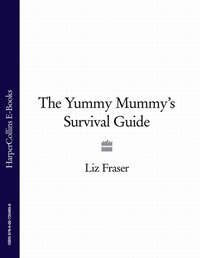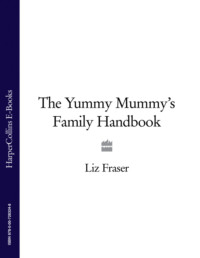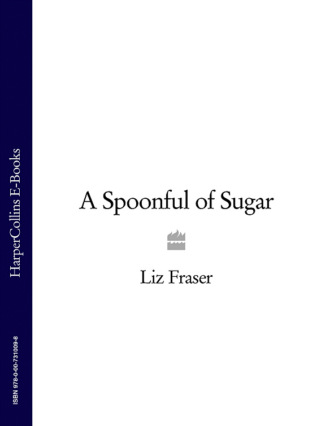
Полная версия
A Spoonful of Sugar

A Spoonful of Sugar

Old-fashioned wisdom for modern-day mothers
LIZ FRASER

For Granny, with love.
CONTENTS
Author’s Note
Introduction
Meet Granny … and what you’re in for
Chapter One: CHILDHOOD
The very basics
The big rush
The curse of worrying
When push comes to shove
Playing by the rules
Letting kids be kids
Chapter Two: HOME SWEET HOME
Household chores
Routine, routine, routine
Illness
Health scares
The great outdoors
Chapter Three: EAT YOUR GREENS
We really are what we eat
The good news
Buying local
The bad news
Strike a balance
Cooking from scratch
Spilling the beans – was it really all home made back then?
(Don’t) supersize them
Chapter Four: PLEASE MAY I GET DOWN?
Animals feed, humans dine. Which are you?
Once upon a breakfast time
Lunchtime, what time?
The evening meal – nervous breakdown anyone?
Getting bums on seats
Who’s at the table?
Eliminating fussy eaters
And you’re not getting down till you’re finished
And for desert: a serving of realism
Chapter Five: BECAUSE I SAY SO
The importance of discipline: at home
Drawing the line
Discipline: where are we now?
Crime and punishment. What to do when they cross the line
Smacking. Oh, here we go
It stands to reason … or does it?
Out of sight, out of order
Another challenge for parents
Chapter Six: RESPECTFULLY YOURS
Where are we now?
How has it got this way?
Generation ME
Manners
Thinking of others: spending time with the Real People
Coming right back at you, Mum
The drinking culture, family and behaviour
How to bring back a little respect
Chapter Seven: DRESSING UP
You’re not going out dressed like that!
Fashionista, baby
Money, money, money
I see, therefore I want
Sexy baby. Ummm, isn’t that exactly the problem …?
Role models
Mummy, I want to look just like everyone else
Chapter Eight: SCHOOL TIME
A is for Attitude
B is for Brains
C is for Computers and stuff
D is for Do It Yourself
SILENCE!
Classroom chaos
Getting tough on unruly kids
Cyber bullying
So what can be done?
Oh, litigation’s what you (don’t) need
Solution 1:throwing out the rule book
Solution 2:on the home front
Chapter Nine: ’TIS WISE TO BE THRIFTY
The curse of consumerism, and how to escape it
‘The price of everything – and the value of nothing’
Yes, it’s credit crunch time
Pester power
Playing ‘green’
Birthday parties – Noooooooo!
Reversing the trend
Pocket money
Chapter Ten: … AND DON’T COME BACK TILL TEATIME
A train ride
Kids in the community
My mum is a control freak!
Community parenting
Fear of other people
A new kind of risk: the internet
Abductions and sexual assaults: the facts
What’s a parent to do?
Chapter Eleven: OH I DO LIKE TO BE BESIDE THE SEASIDE …
Family holidays
Searching for that missing ‘something’
Everything but the kitchen sink
But there’s a whole world out there!
Holiday clubs – love ’em or hate ’em?
Chapter Twelve: MOVING WITH THE TIMES
The ups and downs of the modern world
But everyone else does!
Conclusion
Final Note
Acknowledgements
Permissions
Index
About The Author
By The Same Author
Copyright
About the Publisher
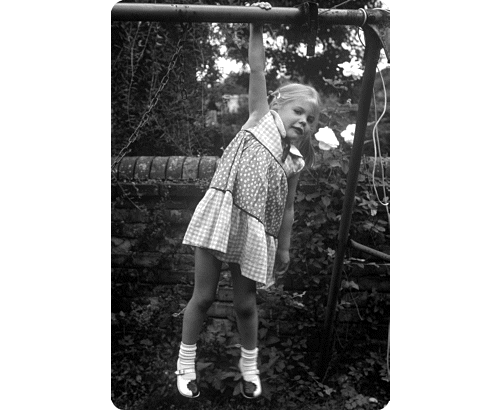
Liz Fraser, aged three
Author’s Note
This book won’t make you or your children perfect. It won’t solve all the problems of parenting; it won’t stop kids writing ‘Suzy has big nokkers’ on bus stops or flicking snot into the freezer compartments in Tesco’s. It won’t answer all of your parenting prayers or make your husband’s tongue more agile. Sorry, but it really won’t.
What it will do is offer a whole host of practical, simple, common-sense solutions to many of the dilemmas faced by all those of us who, despite trying really jolly hard indeed to raise decent citizens of this world, feel we might just be making a dog’s dinner out of it.
Those of us who feel hemmed in by public opinion, government legislation, rules and regulations, by the pace and stress of modern life, technology and consumerism. Those who have had enough of the Negotiation Generation, of the early sexualisation of our daughters, the cotton-wool parenting of our sons, the loss of respect and manners, of not feeling that we can parent our own kids: who feel something precious has been lost and who are equally worried and saddened by what is happening to the people we love the most. In short, those of us who want our children to be allowed to be children again.
What I hope is that this book can make the experience of childhood better for thousands of children growing up in this country today, while making the job of parenting them a good deal easier and more enjoyable for you.
Sometimes you need to look back in order to go forward. Talking to my grandmother – and thereby to a whole generation of parents gone by – has been the most eye-opening and helpful experience I’ve ever had where child-rearing is concerned. I just hope we can pass some of our combined experience and knowledge on to you, too.
Take your pick and see what works for you. Children are only young once and they are our future – so listen to those who have done it before, and then give it your best shot!

Liz and her Granny, 2008
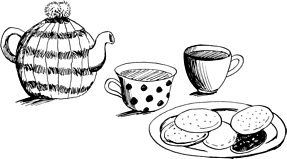
Introduction
One late-August day, I receive a phone call from my Granny: she has recently had an operation to improve the feeble circulation in her leg and foot, and, although she is trying to sound upbeat about it, she is clearly very under the weather, in pain and unusually weak. I decide immediately that a spirit-lifting visit is required, so a week later I, my husband and our three children all pile into the car for a 480-mile drive to the highest inhabited village in the remote Scottish highlands, which Granny calls Home and I call Far Too Bloody Far Away.
As we squash our bottoms into cellulite pancakes all the way up the M6 and beyond, I am more anxious than ever to get there and with every passing motorway service station I have a growing regretful, guilty, wretched feeling that I should have spent more time visiting her in the past. Like most pissed twenty-somethings and self-obsessed thirty-somethings I have been too selfish to make time to visit her; to connect with someone who, suddenly in light of her illness, seems such a vital connection to my children: through her, through my dad and then through me.
As the car hugs the last few miles of mountainous road, my daughter vomits into a carrier bag for the third time and Granny’s village twinkles into view at the end of the final valley, I sense that this visit is going to make quite some impact on my life.
I just don’t know yet that it’s going to fundamentally change how I raise my children, and how I feel as a parent.
Meet Granny … and what you’re in for
Before we meet her, I feel I should give you a brief description of my granny, so you know whose child-raising tips you’re getting along with my own.
Born on the 8th November, 1923, in chilly Aberdeen, Granny was the second daughter and youngest child of a lawyer and a teacher. Not a bad start, then. (Apart from the ‘chilly Aberdeen’ bit, obviously. Brrrrr.) The story goes that her parents were engaged for twelve years before finally being in a position to tie the knot.
By the time Granny came along, her dad was fifty and her mother forty-six, ages which would raise an eyebrow or two even today. Nevertheless, two healthy baby daughters came along who are now the proud holders of the title, Oldest Members of the Family. (And also Most Likely to Buy Junk from Catalogues, but we don’t mention that often.)
Granny met my grandfather when she was about nine years old, on one of her family’s annual holidays to a village in North East Scotland called Tarland. After a mere fourteen years of hide and seek in the bushes, giggling on the tennis court, secret liaisons, separation during the war and making sure they were very, very sure, they finally married in 1945. Blimey, he must have been a catch! And he was.
My granddad was an impressive man: intelligent, sporty and as handsome as any Hollywood star of the day – though, to be brutally honest, a star who’d been eating rather a lot of pies in his latter years – and when I knew him he smelled sweetly of pipe tobacco, had white hair and bushy eyebrows, a huge model train set in the attic and a musty study crammed with artefacts from ancient lands and strange objects from his science labs. He ate lots of cheese and biscuits by the fire in the evenings, and had more stories of faraway places and eccentric characters to tell than anyone I’ve ever met. He also carried a mystical air of unpredictability that meant you never quite knew how far any childish silliness would be tolerated before he’d make it very clear that he wanted you out of his hair. Now, Lassie! In short, he was in every way the perfect grandfather in my eyes, and I still miss him and wish I had spent more time talking with him.
He died four years ago of a heart attack, just after walking the dogs across the moor. All that cheese and biscuits didn’t help, they reckoned.
I digress … Granny studied languages at Aberdeen University but spent the last years of the war code-breaking at Bletchley Park, a time she never talks about except to comment grimly on the lack of mountains and fresh air and the intolerable excess of English people. (I did once try to point out that Bletchley is actually in England, hence the English people, but that went down like a lead balloon.) When she finally escaped back to Scotland she completed her teacher training and then taught for two years, before having her first child – my dad – and settling down into a life of motherhood from then on.
I’m not sure if this true, but certainly it seemed to me that for at least the first twenty years of my life Granny thought I was a silly, giggly, empty-headed, directionless ninny. Certainly my love of daydreaming and making up dance routines when there was a table to be laid didn’t help matters, but I think the clincher was when I started watching Neighbours in my teens. That, dear reader, in my granny’s eyes, won me the Idiot of the Year title hands down.

Liz, aged five, her brother Andrew and Granny, 1979
As a consequence of this grandmotherly disapproval, at least as I saw it, we spoke very little; I didn’t really know her, and what I witnessed of her quick tongue and lightning-fast reactions made me a little nervous around her. But about ten years ago everything changed: in a move that shocked even the most radical, optimistic thinkers in my family, I met a fine young chap, got married, had a baby, and all but gave up work to stay at home and be a Mummy. Ka-pow. The New Liz was born.
Suddenly, Granny and I found common ground: motherhood. Our shared experience of having kids young, working hard to keep the family together, our children happy and healthy and our outside interests going without going bananas during the process created a bond between us that had been woefully absent previously. We started talking on the phone about schools, violin lessons, what my kids were up to and any worries I had about them. The children sent her little pictures. She sent them back letters in old-fashioned handwriting that they couldn’t read.
What I gradually realised was so special about this growing mother-daughter-like relationship was, crucially, that she was not my mother. Mothers can say more to their daughters in one look than the entire script-writing team of Desperate Housewives can in a series. Oh, you feed your baby like that, do you? Oh, she still sleeps in your bed, does she? Grrrr. My mum is actually brilliant at letting me raise my kids my way but still, as we all know, the subject of child-rearing can be prickly indeed, even in the kindest, most caring hands where mothers and their daughters are concerned. But a grandmother stands apart from this, and can dole out advice, criticism and support free from any complicating undertones. She’s your gran – just listen to the lady, and be glad she’s still here sucking pear drops!
And so there grew, over a number of years, a camaraderie between Granny and me that I never imagined I’d feel, and we have become firm friends.
She’s still a tough cookie with a fierce brain though, and it’s a brave person who contradicts her, or says anything stupid in her presence. Allegedly … This lady suffers fools about as gladly as I suffer my own stress-related dandruff, and I’ve learned a thing or two about being idiotic in front of her. Thing one: don’t. Thing two: see thing one.
I realised, as our friendship grew stronger, that I was in the very lucky position of being able to ask my grandmother all the questions about her life, and about how she raised her children, that many mums of my generation either feel they can’t ask, or don’t have the opportunity to ask because their grandparents have passed away.
This wonderful old lady, this suddenly ailing powerhouse, this mine of information who had successfully raised four strong, independent people, could be the key to answering the question asked by thousands of stressed, confused, desperate parents every day: how has it gone so wrong for our children and what can we do to put it right?
If you need evidence that something has gone wrong – and you’d really have had to try hard not to have heard any of this before – then consider the following:






“British children … are more tested, more punished, more imprisoned, more unhappy and more generally disliked, distrusted, feared and demonised than they are pretty much anywhere else in the developed world.”
Deborah Orr, writing in The Independent, June 2008
Yikes! The grim, bleak picture painted above is one that many of us already suspected was there, and fret about daily. It starkly illustrates that our twenty-first-century children are losing out on one of the most important phases of their lives; a time that sets them up for life; a time that is irreplaceable and invaluable. In short, children are missing out on a proper childhood.
Now then, before we get too depressed, it’s important in any discussion about childhood in times past to be very careful not to mythologise it – to see it through the rose-tinted glow of Time; to imagine it was perfect and lovely and happy and jolly for all children. It wasn’t. Times really were tough for many kids, even fifty years ago. There was real hardship. We may remember our own childhoods as a time of sweet innocence, uninterrupted hours of playing with hand-made toys, cooking with mother, climbing trees and watching Fingermouse, but it wasn’t all wonderful! Things our kids take for granted like hot water on demand, central heating making every room in the house toasty and cupboards full of fresh food whenever they’re hungry were not the norm for many of us growing up.
But children were at least given the chance to be children and to enjoy this childhood beyond their fourth birthday – and that’s what’s missing now. Getting that experience back for our kids is the crux of what we’re going to be seeking to do in this book.
Asking where it has all gone wrong is all very well, but what we really need to ask is, how can we put things right? How do you ensure children have a happy childhood these days? Why has it become so difficult and so complicated? And is there anything simpler from previous generations that we could try to implement in ours?
In a bid to answer these and many other pressing questions of the day I decided to ask Granny, while I still could. I talked to her at length about all of this over a period of a year, while her toe-related illness went through it ups and downs, and it’s these conversations that are recounted in this book. I wasn’t sure what I would get: maybe a few snippets of useful information here and there, a funny story or two about tin baths or halfpenny sweets, or a memory dug up from the depths.
What I actually got outstripped all expectations – Granny’s stories and details taught me so much about the essential elements of child-rearing that all of us could put into practice today, and in doing so, remove much of the stress, worry and hair-tearing that seems increasingly to accompany modern parenting. Of course the world is very different now and I’ve allowed for twenty-four-hour TV, internet chat rooms and fast-food chains in my own tips and advice. But I’m now completely convinced that there is much about raising kids and about family life in general we can and should learn, simply by talking to the oldest generation alive today. They generally offer biscuits and limitless tea while they’re at it, so it’s not such a bad deal really.
I hope some of it proves useful and effective to you and makes your experience of raising your own troublesome brood a good deal simpler and more enjoyable than it was proving before. Who knows – we might even manage to raise a generation of kids who can spell ‘No ASBO for me today, thanks’ properly.
I also hope it makes you think about where you come from, how you, and your parents before you, were raised and how you might try to use some of their wisdom and experience in your own children’s upbringing. It’s best to discard the ‘kids up chimneys, regular beatings with sticks and general misery’ and try to stick to the good, sensible bits instead.
But they’re your kids. You decide.
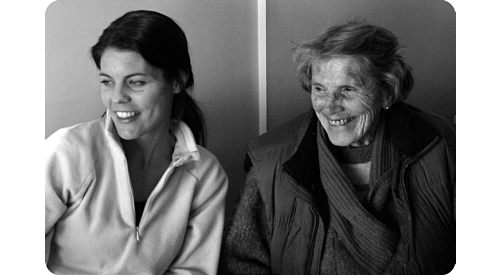
Liz and her Granny in Scotland, November 2008.
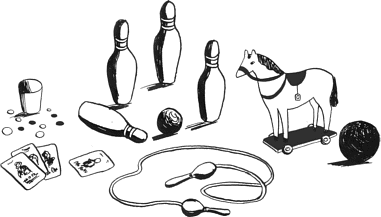
Chapter One
CHILDHOOD
The very basics
The first day of our holiday! And what a day – the sun has made the unprecedented move of coming out for a whole hour (no, really) and my children have missed it all by their own unprecedented move of sleeping until nine o’clock. Typical. I blame the mountain air.


